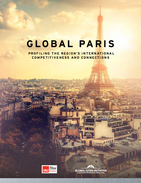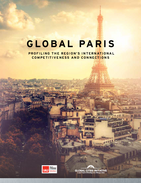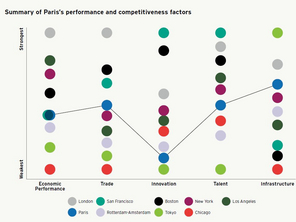Global Paris
The Global Cities Initiative is a joint project of Brookings and JPMorgan Chase.
This report is a joint project of Brookings and JPMorgan Chase and the support of L'Institut Paris Region. It provides a framework for leaders in the Paris region to sustain the region’s prosperity and to better understand its competitive position in the global economy.
In imagination and in fact, Paris is a quintessential global city. It has been one of the world’s most visited places for centuries, and its economy prospers today thanks to a well-educated workforce, modern infrastructure, and global niches in creative industries, business services, and tourism. Yet, facing new pressures related to globalization, technological disruption, and demographic change, the region’s growth has lagged relative to global peer regions that share its economic size, wealth, and industrial structure. To deliver economic opportunities for its residents, Paris must boost growth.
Insights on Paris’s global economic position by benchmarking the region against eight global peer regions
This report offers information and insights on Paris’s global economic position by benchmarking the region against eight global peer regions based on economic size, wealth, productivity, industrial structure, and competitiveness. Its key findings are:
- Trade. Paris specializes in a diverse set of tradable industries—from financial and business services to advanced manufacturing to creative industries—but is limited by low participation of small and medium-sized enterprises (SMEs) in trade.
- Innovation. Paris accounts for significant shares of national research and development (R&D), patents, and venture capital, but it is not yet on par with other leading innovation hubs.
- Talent. Paris is one of the most educated regions in the world, but it has higher unemployment than peer regions.
- Infrastructure. Paris’s transportation and digital connectivity are strong, but it must continually invest to address bottlenecks.
- Governance. Satisfaction with government services is in line with peer countries, but the region’s business and regulatory environment is more restrictive than in city competitors.
This page is linked to the following category :
Economy


